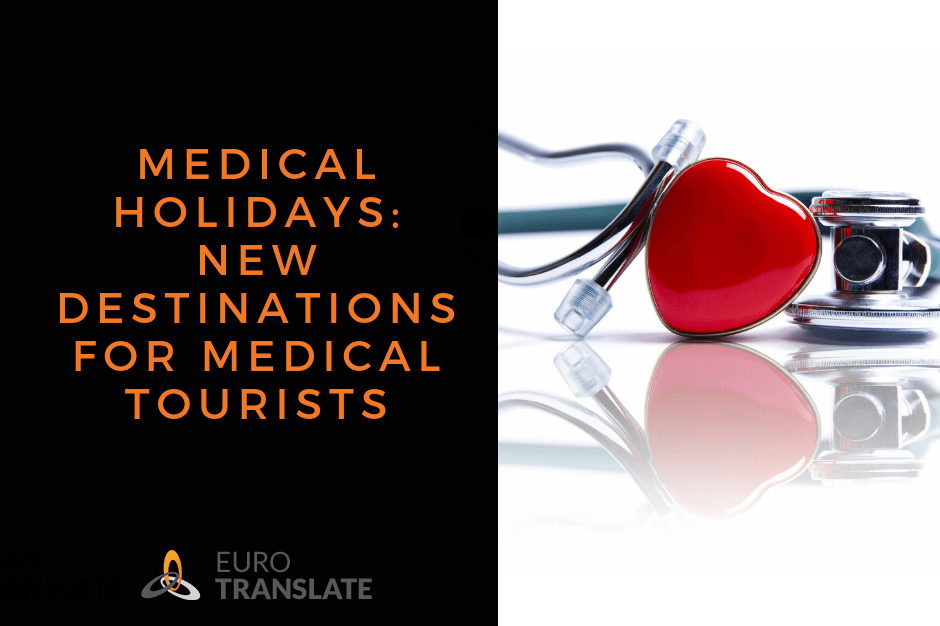
BIG BUSINESS
Medical tourism has become big business in an array of countries in the past years. With the number of medical tourists increasing at a rapid pace, the industry is steadily growing. Many people travel abroad for medical reasons as they can’t find affordable healthcare services in their home countries or they need better treatment options for their illnesses. Sometimes, patients require high-end surgical procedures that are unavailable at home and thus they come to consider medical tourism as an option.
According to Transparency Market Research’s report “Medical Tourism Market,” factors such as an aging population, escalating healthcare costs and better exchange rates push the case for this rise in global medical tourism.
The trend had started in Asia, with UK and US patients visiting Thailand, India or Malaysia for a variety of medical procedures, but in recent years the focus has shifted and now we see the same amount of travellers targeting Eastern European countries in pursuit of cheaper and more accessible healthcare services.
Competitive prices (which can be around 50% lower than the UK), high standards of healthcare, stable governments, cheap flights and inexpensive accommodation plus a handy lack of tropical diseases are rerouting medical tourists away from the popular Asian and South American destinations to Europe.
MEDICAL TRAVEL ON THE RISE IN EUROPE
Medical tourism is on a steady rise in Central and Eastern Europe — it has been growing 12-15 per cent annually, according to research published the consulting company PwC.
Patients from both the West and the East come to Europe on their medical holidays. Those from Germany, the UK and Nordic countries usually choose one-day, cosmetic treatments or medical spas, attracted by competitive prices that can be two to three times lower than in their home countries. This trend has been further supported by an EU directive, implemented in 2013, that enables patients to obtain medical treatment in any member state and have it refunded if it is covered by relevant national healthcare systems.
With more low-cost airlines than ever before offering discount flights to almost anywhere on the continent, it’s now possible to easily visit countries that offer medical treatments and surgeries at very low prices.
It’s estimated that around seven million people cross national borders every year searching for medical care, ranging from dental, cosmetic and weight-loss to orthopaedic, cardiovascular, reproductive and cancer treatments and everything in between. Many are Americans without health insurance, looking for lower costs than in the US, or Brits and Canadians who’ve hit a dead-end or long waiting lists at home.
For patients making the trip to central and eastern European countries, it’s a package deal: they get to visit amazing, old cities with long and rich histories and enjoy beautiful natural landscapes coupled with the possibility of high-quality, low-cost medical services. All in all, Central and Eastern Europe is an increasingly attractive destination for Western Europeans. Why pay a fortune for a procedure at home when you can get the same thing for less in a neighbouring country, and at the same time enrich your life with a relaxing visit to the seaside, thermal waters or an incredible archaeological site?
MEDICAL TRANSLATIONS
More and more Eastern European countries are getting in on the health tourism game, competing largely for British and American visitors, as these two nations produce the largest numbers of globetrotters seeking medical treatments abroad. But what’s all this got to do with language?
Patients and clinicians involved in medical tourism need translated copies of medical records, diagnostic test results, lab results, discharge summaries, and other documents — both to prevent complications arising from the procedures carried out in different-language countries, and for relaying this critical information to primary care providers back home.
In addition, patients who travel to other countries to receive medical treatments want to be sure that they understand the paperwork fully before they commit to the time and expense of making the journey, so it is often necessary to translate paperwork containing detailed medical references, including everything from descriptions of the services to be provided to the legal paperwork signed by the patient before receiving treatment.
It is always a good idea to have your medical history translated before you travel. Detail any major illnesses, medication, allergies, and so forth, and avoid abbreviations. If you happen to have a medical emergency and no one can speak English, you can at least produce this document containing your vital healthcare information. Find a professional translation agency to do it for you. Don’t rely on free websites or translation software as medical translations are very difficult and require excellent attention to detail – just one incorrectly translated word can bring about a whole host of problems!
EUROTRANSLATE UK is a translation agency specialising in the languages of the Balkans and South Eastern Europe. We can take care of translation and localisation from the main world languages in the medical, legal and technology fields.
From legal certification to marketing and websites, EuroTranslate UK is here to help your company communicate with your customers in this expanding economic region.
When it comes to medical translation just speak to us about our language specialists, we are very proud of them, both as doctors and clinicians and as translators.
